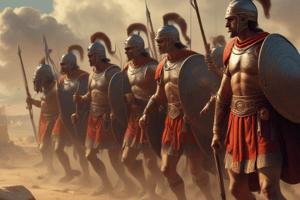Podcast
Questions and Answers
What was the primary cause of the First Punic War?
What was the primary cause of the First Punic War?
- Disputes over control of Sicily. (correct)
- Economic competition between Rome and Carthage.
- Disputes over land in the Italian Peninsula.
- Carthaginian expansion into Gaul.
Which battle is considered Hannibal's greatest victory during the Second Punic War?
Which battle is considered Hannibal's greatest victory during the Second Punic War?
- Battle of Ticinus
- Battle of Zama
- Battle of Mylae
- Battle of Cannae (correct)
What was the outcome of the Second Punic War for Carthage?
What was the outcome of the Second Punic War for Carthage?
- Carthage gained territories in Italy.
- Carthage established a strong naval presence in the Mediterranean.
- Carthage lost its empire in Spain and faced indemnity payments. (correct)
- Carthage signed a treaty that allowed military cooperation with Rome.
What significant event marked the conclusion of the Third Punic War?
What significant event marked the conclusion of the Third Punic War?
How did the Punic Wars impact Rome's status in the Mediterranean?
How did the Punic Wars impact Rome's status in the Mediterranean?
Flashcards are hidden until you start studying
Study Notes
The Punic Wars
Overview
- A series of three wars fought between Rome and Carthage.
- Occurred from 264 BC to 146 BC.
- Significant in establishing Rome as the dominant power in the Mediterranean.
First Punic War (264-241 BC)
- Cause: Disputes over control of Sicily.
- Key Events:
- Naval battles; Rome developed a fleet from scratch.
- Major battle: Battle of Mylae (260 BC) - Rome's first significant naval victory.
- War concluded with the Treaty of Lutatius (241 BC).
- Outcome:
- Rome gained Sicily, the first Roman province.
- Carthage was forced to pay a large indemnity.
Second Punic War (218-201 BC)
- Cause: Tensions arose from Carthaginian expansion in Spain and Rome's refusal to allow it.
- Key Events:
- Hannibal's famous crossing of the Alps to invade Italy.
- Major battles:
- Battle of Ticinus (218 BC) - Hannibal's early victory.
- Battle of Cannae (216 BC) - Hannibal's greatest victory; Roman forces decimated.
- Roman resilience led by Scipio Africanus.
- Battle of Zama (202 BC) - decisive Roman victory.
- Outcome:
- Carthage lost its empire in Spain.
- Paid a heavy war indemnity and surrendered its navy.
Third Punic War (149-146 BC)
- Cause: Rome's desire to eliminate Carthage as a threat.
- Key Events:
- Romans besieged Carthage for three years.
- In 146 BC, the city fell after fierce fighting.
- Outcome:
- Carthage was destroyed; its inhabitants were killed or enslaved.
- Roman province of Africa established.
Significance
- Established Rome as the primary power in the Mediterranean.
- Carthaginian influence ended, and the contrast between Roman and Carthaginian military tactics was highlighted.
- Shifted balance of power, setting the stage for further Roman expansion.
The Punic Wars
- Three wars fought between Rome and Carthage from 264 BC to 146 BC
- Defined Roman rise to power in the Mediterranean
First Punic War (264-241 BC)
- Sparked by rivalry over control of Sicily
- Rome, initially land-based, built a fleet and won the Battle of Mylae in 260 BC - first major naval victory
- Treaty of Lutatius in 241 BC ended the war
- Results: Rome gained Sicily as its first province and Carthage paid a large indemnity
Second Punic War (218-201 BC)
- Fueled by Carthaginian expansion in Spain and Roman refusal to allow it
- Hannibal, Carthaginian general, crossed the Alps to invade Italy
- Key battles included:
- Battle of Ticinus (218 BC) - Hannibal's first victory
- Battle of Cannae (216 BC) - Hannibal's greatest victory, decimating Roman forces
- Roman resilience under Scipio Africanus led to the Battle of Zama (202 BC) - decisive Roman victory
- Carthage lost its Spanish empire, surrendered its navy, and paid a heavy indemnity
Third Punic War (149-146 BC)
- Roman desire to eliminate Carthage's threat as the motivation
- Romans besieged Carthage for 3 years
- Carthage fell in 146 BC after fierce fighting
- Result: Carthage destroyed, its inhabitants killed or enslaved, and the Roman province of Africa established
Significance
- Solidified Rome as the dominant force in the Mediterranean
- Marked the end of Carthage's influence, revealing strategic differences between Roman and Carthaginian military tactics
- Shifted the balance of power, setting the stage for further Roman expansion
Studying That Suits You
Use AI to generate personalized quizzes and flashcards to suit your learning preferences.





